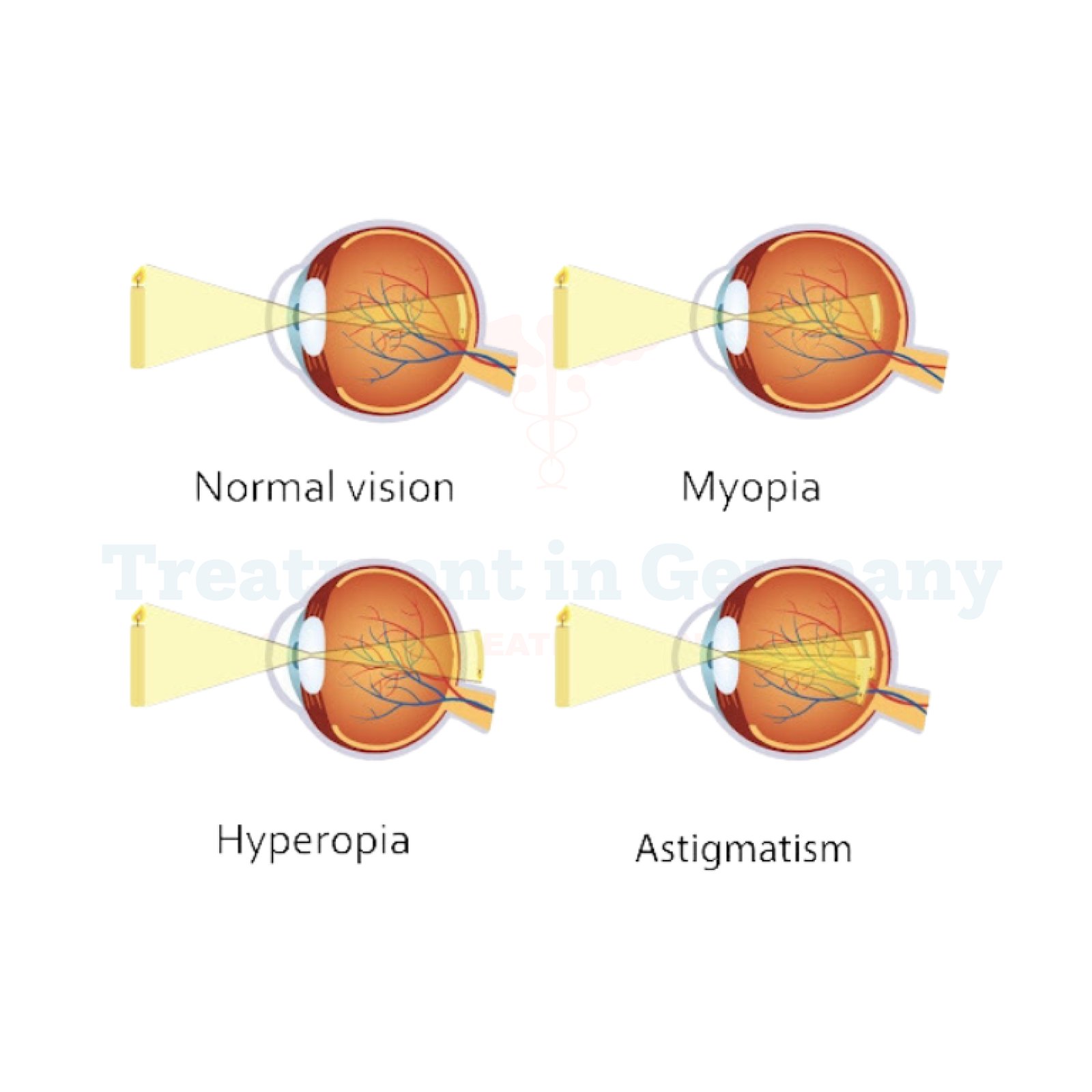Myopia (Nearsightedness) Treatment in Germany
Take control of your eye health with world-class treatments for myopia (nearsightedness) in Germany. Early intervention can improve your vision, lower risks of serious eye conditions, and provide a brighter, clearer future.
Understanding Myopia
Myopia, or nearsightedness, is a common eye condition that makes it difficult to see distant objects clearly. Here's what you need to know about it:
- How It Affects Your Vision: Objects far away appear blurry, while close-up vision remains sharp.
- Who It Affects: It often develops during childhood and can progress with age if left unchecked.
- Global Concern: Myopia is increasingly prevalent worldwide due to factors like excessive screen time and reduced outdoor activities.
Side Effects of Myopia
If left untreated, myopia can lead to more than just inconvenience. Here’s what’s at stake if you don’t address it early on:
- Strain on Daily Activities: Tasks like driving or watching presentations become harder.
- Progressive Vision Decline: Risk of worsening myopia over time leads to stronger prescriptions.
- Serious Eye Conditions: Advanced myopia can increase risks of retinal detachment, glaucoma, or cataracts.
Causes of Myopia
Understanding the causes of myopia is vital for effective treatment and prevention. Key factors include:
- Genetics: A family history of nearsightedness increases your likelihood of developing it.
- Lifestyle Habits: Extensive use of digital devices and insufficient time outdoors contribute to its progression.
- Environmental Factors: Poor lighting and improper reading habits can also have an impact.
Diagnosis of Myopia
Timely diagnosis is crucial for managing myopia effectively. Here’s how it’s detected:
- Routine Eye Exams: An eye care professional measures your ability to see both near and far objects.
- Refraction Testing: Determines the exact prescription needed to correct your vision.
- Comprehensive Assessment: Advanced tools may assess the structure and health of your entire eye.
Treatment Options in Germany
Germany offers cutting-edge treatments to address myopia with exceptional precision and care. Here are the main options available:
- Prescription Glasses or Contact Lenses: Correct vision for day-to-day clarity.
- Orthokeratology (Ortho-K): Special overnight lenses temporarily reshape the cornea, enhancing vision throughout the day.
- Laser Eye Surgery: State-of-the-art procedures like LASIK and PRK provide long-term results by reshaping the cornea.
- Medications: Specialized eye drops can slow the progression of myopia in children and young adults.
- Innovative Treatments: Access to advanced therapies and medical technologies available in Germany.
Prevention and Management of Myopia
Preventing and managing myopia requires adopting a proactive and informed approach. Consider these best practices for maintaining lifelong eye health:
- Encouraging Outdoor Time: Exposure to natural light can reduce the risk of myopia development in children.
- Eye Strain Reduction: Follow the 20-20-20 rule to relieve stress from prolonged screen use.
- Regular Check-Ups: Stay ahead by regularly visiting eye care professionals to monitor vision changes.
- Protective Eyewear: Use glasses with anti-glare or UV coatings for added protection against harmful light.
Why Choose Myopia Treatment in Germany?
Germany is considered a global leader in providing top-quality eye care. Here’s why it stands out for myopia treatment:
- Advanced Medical Technology: Access to globally recognized innovations in diagnostics and treatment.
- Highly Skilled Specialists: The country is home to expert ophthalmologists and vision care professionals.
- Comprehensive Care: Germany emphasizes a holistic approach, ensuring both treatments and preventative care are top-notch.
- State-of-the-Art Clinics: Modern facilities equipped with cutting-edge tools ensure the highest standards of care.
- Trust and Reliability: Germany’s healthcare adheres to stringent safety and quality regulations, offering peace of mind to patients.
Conclusion
Germany's dedication to excellence in healthcare, particularly in the field of ophthalmology, positions it as a trusted destination for myopia treatment. Patients from around the world benefit not only from the expertise and advanced technology available but also from the country's commitment to personalized care. Whether seeking preventative measures or corrective solutions, Germany's focus on innovation and reliability ensures outstanding outcomes, making it a leading choice for vision care.
👉 Contact us for further information and receive a complimentary consultation.


.webp)
 (1).webp)

.webp)
 (1).webp)


.webp)
 (1).webp)

.webp)
 (1).webp)
